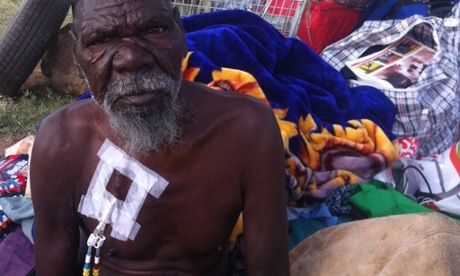
A “sick old man” on dialysis treatment was forced to live under a tree in Alice Springs for more than a week after he was evicted from the only hostels available to patients from remote communities and not provided with any alternative accommodation.
Advocates said Noel Charlie’s case was shocking and that he was just one of many people suffering in an under-resourced system which offered little or no safety net in the Northern Territory.
Charlie, from Kiwirrkurra 850km to the west, was living at Aboriginal Hostels Limited’s (AHL) Alyerre home and having dialysis treatment for five hours every second day. It is understood he was given multiple warnings about smoking in his room and clashing with other residents, and the hostel decided to evict him on 12 February.
However, no alternative arrangements were found and Charlie was left to sleep rough, where he faced being fined by the council.
When Guardian Australia met him last week Charlie was seeking respite from the midday heat of almost 40 degrees at Purple House, a not-for-profit clinic offering dialysis treatments to Indigenous people living in remote areas.
“I’m sitting down [under] the tree, like a kangaroo or a dog. No air-conditioning, no cold water,” he said of his camp.
“I’m from the bush, I’ve got no house, like the first time I’ve come to this town it’s because I’ve got no kidney.”
Sarah Brown, the chief executive of Purple House, said the hostel’s decision to evict Charlie after repeated warnings was understandable, but the solution should not be to render a sick man homeless.
There is a lack of “cultural safety [and] cultural awareness” which Brown said made it incredibly difficult for people like Charlie who have lived in the bush all their lives.
“[His] kidneys fail and he has to come in here to hospital and you end up in a hostel where there’s lots of rules, and you can’t cook for yourself and you’ve got no control … It’s like everything becomes regulated. People have no agency,” Brown told Guardian Australia.
Brown said increasing numbers of people on dialysis were coming in for treatment and that this was the last place many of them would see before they died. “That demands a different sort of care and understanding,” she said.
In 2012-13, 18% of Indigenous Australians had indicators of chronic kidney disease, according to Kidney Health Australia, and were almost four times more likely to die from it than non-Indigenous Australians. The rate of end-stage kidney disease is almost 20 times higher for Indigenous people in very remote areas compared with non-Indigenous people.
The day after Guardian Australia met Charlie, Purple House and an aged care advocate found him accommodation at a homeless men’s shelter, where he stayed over the weekend, but it is only temporary.
Richard Farrell, the social services division manager at Tangentyere Council, said there used to be a safety net for people like Charlie in Alice Springs – the intervention and case management service (ICMS) – until it lost funding. The ICMS used emergency funding to find accommodation and case-manage vulnerable people like Charlie.
“[The government] wonders why they’ve got these issues,” Farrell told Guardian Australia. “They cut funding and the sector tells them these are going to be the consequences, they say: ‘No, no, no, we know better’, and then two years later you’re back to square one at the very beginning of the problem again,” he said.
The result is more cases like Charlie – “a sick old man who’s here for dialysis and has no safe, stayable accommodation so he’s going to get sicker,” said Farrell.
AHL provides 120 beds across three of its hostels for renal patients in Alice Springs. It told Guardian Australia that while it could not discuss specific cases, “AHL does take its duty-of-care responsibilities to ensure the safety and wellbeing of all our residents very seriously. In a case where a resident is found to be unsuitable, AHL will explore every possible option in working with the resident and other organisations for a suitable outcome”.
The spokesman said AHL worked closely with support services including accommodation, “to make sure that residents in our care can access the full range of services they need”.
Purple House called for resources to be allocated or diverted to provide remote health clinics with dialysis units, enabling people like Charlie to receive treatment in their home area.
Brown argued that Purple House – which receives no government funding – could offer remote dialysis treatment cheaper and more efficiently if the government diverted funds to them. There would be no need for the accommodation support, interpreters and social workers required when people travel to Alice Springs.
Kiwirrkurra, described as Australia’s most remote community, has two dialysis units and Purple House tries to rotate patients through Alice Springs so they can at least spend some time at home while receiving treatment.
Charlie said he was “on a mission” to see his people receive treatment in communities.
“They want more dialysis in Kiwirrkurra and more machines in their country. Because a lot of people … they die on the machine, not on their country,” said Charlie.
“They’ve been dying in Broome and Perth and then come back to their own country. Same in Kiwirrkurra, Warburton, Yuendemu.”
The NT government told Guardian Australia “a schedule of new health centres” would see one or two new dialysis units in Ngukurr, Galiwinku, Numbulwar and Robinson river. One health centre has already opened at Ntaria, and construction is about to begin at Elliott and Canteen creek, a spokeswoman for the health minister, John Elferink, said.
The department was unable to respond to questions about accommodation services by deadline.
